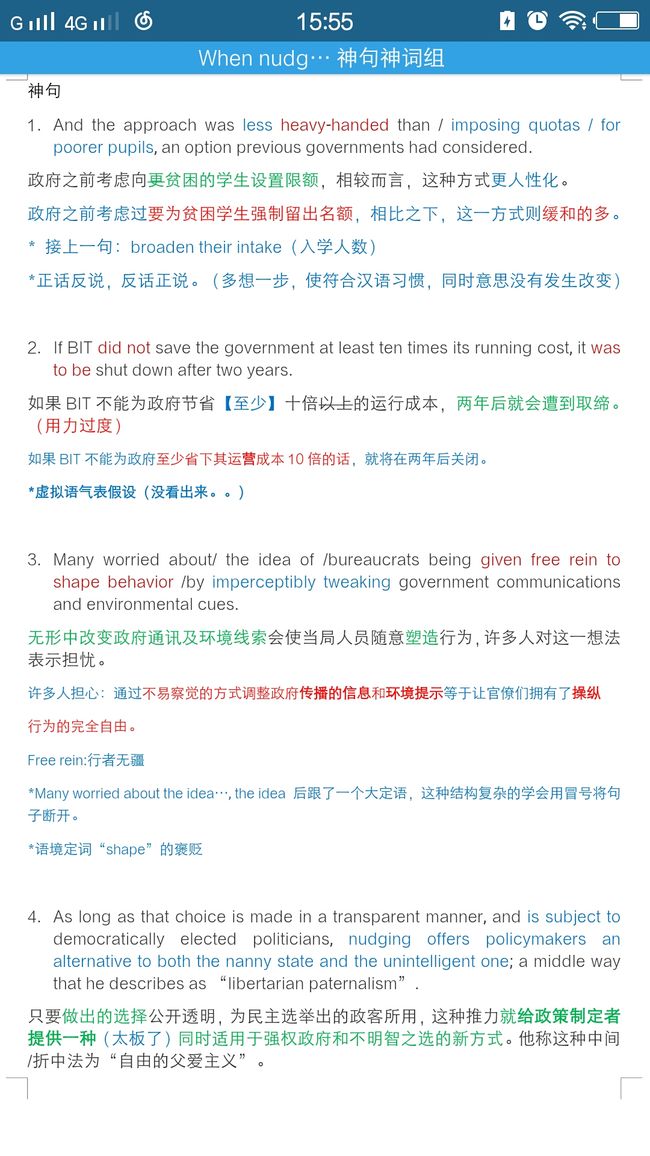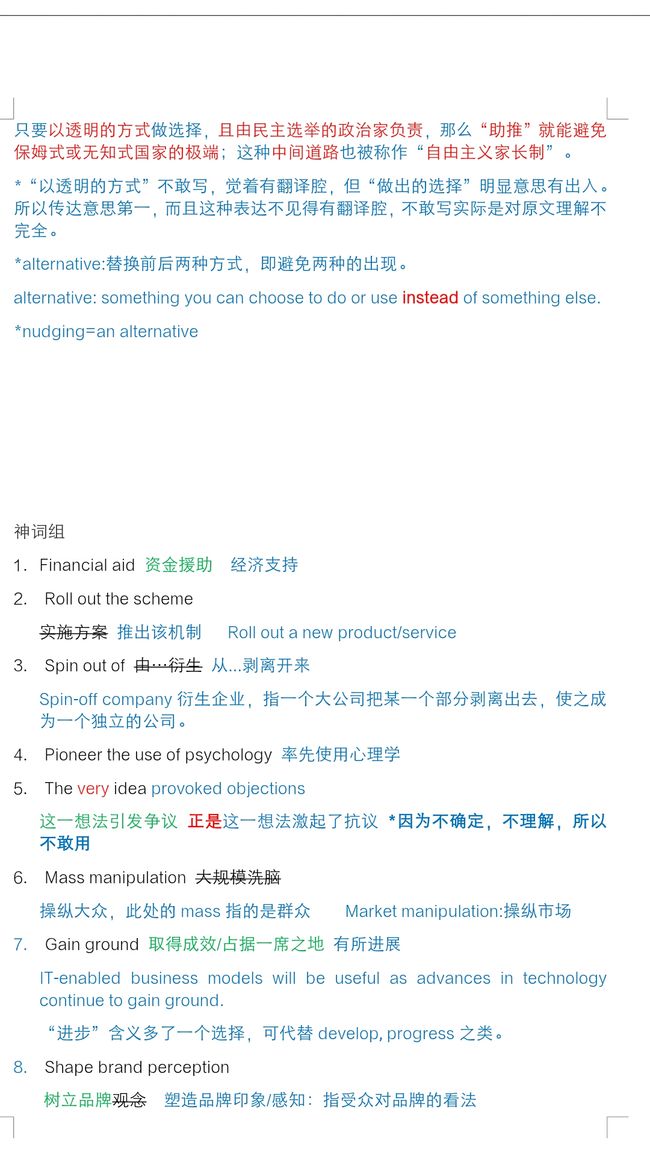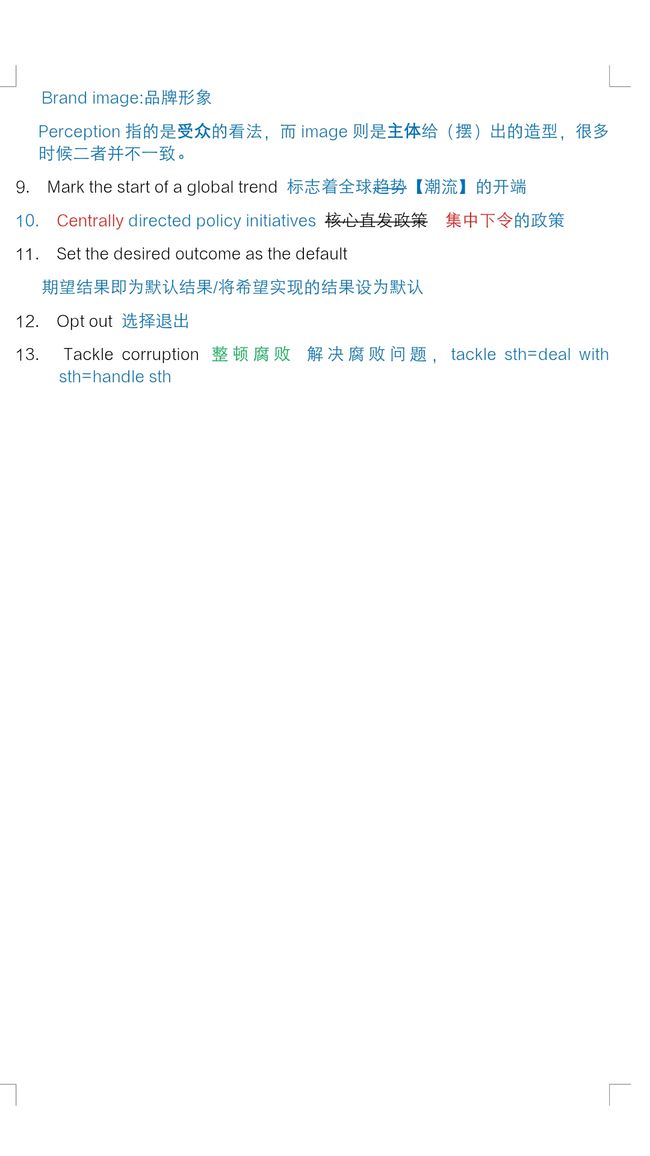Vocabulary
nudge: a slight push or shake.
shove: a strong push.
nurture: to help a plan, idea, feeling etc to develop.
aspiration: a strong desire to have or achieve something. syn: ambition.
initiative: an important new plan or process to achieve a particular aim or to solve a particular problem.
the initiative: if you have or take the initiate join a school, profession etc , you are in a position to control a situation and decide what to do next.
intake: the number of people who join a school, profession at a particular time.
intake of breath: a sudden act of breathing in, especially when you are shocked.
other people’s feelings. 铁腕手段
heavy-handed: talking too much action or extreme action, especially without thinking about other people’s feelings.
quota: an official limit on the number or amount of something that is allowed in a particular period.
roll out: to make a new product available for people to buy to buy or use.
fade: or fade away. to gradually disappear
fade into insignificance: to seem unimportant.
fade in/out: to appear/disappear slowly or become louder/quieter, or to make a picture or sound do this.
stray: to begin to deal with or think about a different subject from the main one, without intending to do it.
to move away from the place you should be.
manipulation: to make someone think and behave exactly as you want them to, by skillfully deceiving or influencing them.
rest on: rely on/depend on/lie in
by and large: used when talking generally about someone or something.
allay (somebodys) fear/concern/suspicion etc: to make someone feel less afraid, worried etc.
iterative: to say or do something again. (formal)
gain ground: to become more successful. antonym: lose ground
If an idea, belief gains ground, more people start to accept it.
to get closer to someone or something you are competing with.
genesis: the beginning or origin of something.
inherent: a quality that is inherent in something is a natural part of it and can not be separate from it.
dedicated: made for or used for only one particular purpose.
predate: to happen or exist earlier in history than something else.
tweak: to make small changes to a machine, vehicle, or system in order to improve the way it works.
default: the usual and expected way in which something is done, unless you decide to do something different. 默认
by default: 弃权
in default of something: (formal) because of the lack or absence of something.
opt out: to avoid doing a duty.
to decide not to be part of a group or system.
tax return: document giving the tax controllor information about taxpayer’s tax ability. 纳税申报单
emphatic: expressing an opinion, idea etc in a clear, strong, way to show its importance.
emphatic win/victory/defeat: a win etc in which one team or player by a large amount.
draw on/upon: to use information, experience, knowledge etc for a particular purpose.
frame: (formal) to organize and develop a plan, system.
(formal) to carefully plan the way you are going to ask a question, make a
statement etc.
pay up: to pay money that you owe, especially when you do not want to or you
are late.
evasion: when you deliberately avoid dong something hat you should do, or
paying the amount of money that you should pay.
take-up: the rate at which people accept something that is offered to them.
screening: medical tests that are done on a lot of people to make sure that they do
not have a particular disease.
tinker: to make small changes to something in order to repair it or make it work
better.
margin of error: the degree to which a calculation might or can be wrong.
margin for error: how many mistakes you can make and still be able to achieve something,
on the margin(s): a person on the margins of a situation or group has very little power, importance, or influence.
bring somebody/something to: to make someone become involved in a discussion or situation.
to cause someone or something to be in a particular situation.
Fleeting: lasting for only a short time.
Prospective employees/candidate/buyers etc: someone who is likely to do a particular thing or achieve a particular position.
2) likely to happen.
Note down: to write something down so that you will remember it.
Turnout: the number of people who vote in an election.
Imminent: an event is imminent, especially an unpleasant one, will happen very soon.
Nanny: a woman whose job is to take care of the children in a family, usually in the familys own home.
The nanny state: a government which tries to control the lives of its citizen much.
Deride: to make remarks or jokes that shoe you think someone or something is silly or useless. Syn: mock derisive
deride somebody as something.
Overtones: signs of an emotion or attitude that is not expressed directly.
Imperceptible: almost impossible to see or notice.
Cue: (right/as if) on cue: happening or done at exactly the right moment.
Take your cue from somebody: to use someone elses actions or behaviors to show you what you should do or how you should behave.
proponent: someone who supports something or persuades people to so something.
Nefarious: evil or criminal.+
precinct: the main police station in a particular area of a town or city.
Disproportionately: too much or too little in relation to something else.
Strike something down: to say that a law, decision etc is illegal and officially end it.
On appeal: 上诉
Incorporate: to include something as part of a group, system, plan etc.
Phrase&terms
behavioural science: 行为科学
gain good marks: 取得不错的成绩
progress (v) to university: 继续到大学学习.
impose quotas: 强制保留名额
mental shortcuts: 心理捷径
the sickly (adj) sibling to economics: 经济学的病态同胞
raise the likelihood: 增加可能性
late payment: 逾期付款
public bodies: 公共机构
police forces: 警备力量
run the headline: 成为标题
result the best outcomes: 产生最佳结果
1. nudge (theory): a concept inbehavioural science,political theoryandeconomicswhich proposespositive reinforcementand indirect suggestions to try to achieve non-forcedcompliancetoinfluencethe motives, incentives anddecision makingof groups and individuals. The theory claims to be at least as effective, if not more effective, than direct instruction, legislation, or enforcement. The concept has influenced British and American politicians.
A nudge, as we will use the term, is any aspect of thechoice architecturethat alters people's behavior in a predictable way without forbidding any options or significantly changing their economic incentives. To count as a mere nudge, the intervention must be easy and cheap to avoid. Nudges are not mandates. Putting fruit at eye level counts as a nudge. Banning junk food does not.
2. Choice architectureis the design of different ways in which choices can be presented to consumers, and the impact of that presentation on consumerdecision-making.
3. TheBehavioural Insights Team(BIT), also known unofficially as the "Nudge Unit", is an organisation that was set up to applynudge theory(behavioural economicsandpsychology) to try to improve government policy and services as well as to save theUK governmentmoney.
4. Orwellian overtones: 欧威尔之意
"Orwellian" is an adjective describing a situation, idea, or societal condition that George Orwell identified as being destructive to the welfare of a free and open society. It denotes an attitude and a brutal policy of draconian control by propaganda, surveillance, misinformation, denial of truth, and manipulation of the past, including the "unperson"a person whose past existence is expunged from the public record and memory, practised by modern repressive governments. Often, this includes the circumstances depicted in his novels, particularly Nineteen Eighty-Four[2] but political double-speak is criticized throughout his work, such as in Politics and the English Language.
5. checks and balances 制衡
The separation of powers, often imprecisely and metonymically used interchangeably with the trias politica principle,[1] is a model for the governance of a state (or who controls the state). Under this model, the state is divided into branches, each with separate and independent powers and areas of responsibility so that the powers of one branch are not in conflict with the powers associated with the other branches. The typical division is into three branches: a legislature, an executive, and a judiciary, which is the trias politica model. It can be contrasted with the fusion of powers in some parliamentary systems where the executive and legislature (and sometimes parts of the judiciary) are unified.
Separation of powers, therefore, refers to the division of responsibilities into distinct branches to limit any one branch from exercising the core functions of another. The intent is to prevent the concentration of power and provide for checks and balances.
6. Libertarian paternalism(自由的父爱主义) ,
Sometimes described as a form of soft paternalism, is the idea that it is both possible and legitimate for private and public institutions to affect behavior while also respecting freedom of choice, as well as the implementation of that idea. The term was coined by behavioral economist Richard Thaler and legal scholar Cass Sunstein in a 2003 article in the American Economic Review. The authors developed their ideas in a longer article in the University of Chicago Law Review that same year. They propose that libertarian paternalism is paternalism in the sense that "it tries to influence choices in a way that will make choosers better off, as judged by themselves" The concept paternalism specifically requires a restriction of choice. It is libertarian in the sense that it aims to ensure that "people should be free to opt out of specified arrangements if they choose to do so" The possibility to opt-out is said to "preserve freedom of choice" Thaler and Sunstein published a book-length defense of this political doctrine in 2008 (new edition 2009).
7. The replication crisis (or replicability crisis) 复制危机
refers to a methodological crisis in science in which scientists have found that the results of many scientific experiments are difficult or impossible to replicate on subsequent investigation, either by independent researchers or by the original researchers themselves. While the crisis has long-standing roots, the phrase was coined in the early 2010s as part of a growing awareness of the problem.



